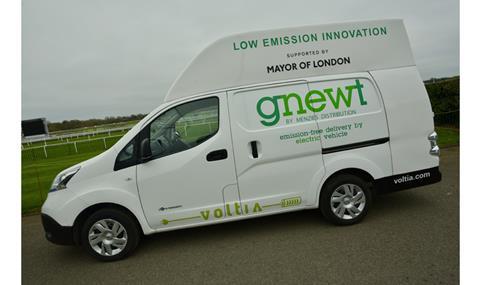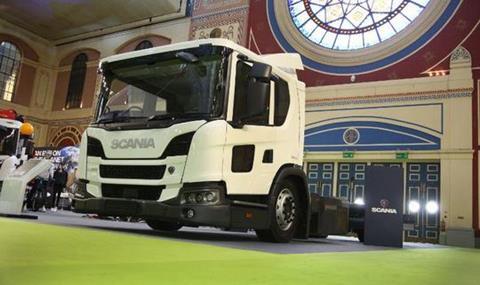2020 may be the year when battery electric vehicles some of age and what have been until now largely prototypes start to become mainstream, according to speakers in the Tech Talk sessions at the 2019 Freight in the City Expo at London's Alexandra Palace last week.
Swedish start up Volta – not to be confused with Volvo or Voltia who were also at FiTC – is aiming to put close-to-production spec demonstration versions of its 18-tonne full battery electric truck on the roads with customers in the UK and France next summer, start building customer vehicles in 2021 and begin full series production in 2022, according to its co-founder and chief technology officer Kjell Waloen.
While not quite sounding a death knell for diesel, Waloen said that the high-risk purchase was no longer an electric vehicle. “Buying a diesel truck is now a big gamble,” he claimed. “Who knows what you will be able to do with that in seven years.”
Volta is trying to take the risk out of going electric by offering its purpose-built BEVs “as a service” rather than for outright purchase.
Operators signing up for seven years will get the vehicle, maintenance, smart charger, driver training and all the electricity for a fixed monthly fee that “should be competitive with diesel”. Waloen said: “Now the total cost of ownership is on a par with diesel. We offer the truck as a service which takes away all the risk.”
The box-like Volta truck has a range of around 150km and a recharge time of three to four hours depending on the battery pack chosen. It sits the driver in the middle of a clean, low-entry cab with excellent all-round vision and a rear view supplied by cameras rather than mirrors. A refrigerated version will be available.
“It has an attractive interior that will appeal to the high-tech younger generation,” said Waloen. “We will be testing it in London and Paris first where we expect the biggest demand.”
Gnewt Cargo was founded 10 years ago by head of business development Sam Clarke. Now part of Menzies Distribution, it operates a 70-strong fleet of full electric BEVs carrying out low emissions last mile distribution. Clarke described a two-year trial that is nearing completion supported by the Major of London to use larger capacity BEVs and so reduce congestion on the capital's streets.

The vehicles included 15 Voltia vans (Nissan eNV200s fitted with a larger body), pictured, seven eNV200s that were rebodied by Vic Young and four Fiat eDucatos fitted with smaller batteries supplied by BD Auto. An EO smart charging system supplied 60 new charging points for the trial fleet to ensure the electricity network was never overloaded and telematics monitored the state of change of each vehicle. “Electric vehicles don't work without smart charging,” said Clarke. The results of the trial will be published at the end of 2019.
The importance of telematics and geofencing to getting the most from EVs was emphasised by Andrew Pearce, director of LEVL Telematics, the UK supplier of the world's largest telematics system Geotab. Worldwide there are over 1.9m Geotab devices installed and Pearce said it was “the only EV-ready solution”.
Geotab is used by major fleets that are already rolling out EVs including UPS, DPD, Pepsico and Milk & More and by monitoring the state of the battery, the energy used and the driver behaviour it can extend the range of the vehicle.
LEVL is also able to carry out EV suitability assessments by installing Geotab into a fleet and, based on usage, recommend which vehicles could go electric. “We can match existing EVs to the opportunities,” said Pearce. “We can also then install a charging system with EO and Centrica.”
Pearce cited Milk & More, the fresh food delivery network acquired by Muller from Dairy Crest in 2015, which is aiming to convert all its 1,200 vehicles to full electric by 2025. Ironically the firm started out with electric milk floats but phased these out in favour of diesel before starting to introduce electric Street Scooters in 2016 and LDV EV80s in 2019. “All 1,200 vehicles will use Geotab,” said Pearce.
While full battery electric trucks are gaining ground, the range extender may still have a role to play. Scania showed a production-ready 9-litre L-series 6x2 rigid series hybrid that can run 10kms on batteries within ultra low emissions zones before switching to diesel for stem mileage, pictured.

A plug-in version, maximising use of the batteries by ensuring they are fully charged at the start of every shift, will be available next year.
UK truck convertor Tevva has been building range extended electric trucks using small diesel or petrol internal combustion engines (ICEs) to recharge vehicle batteries on the move in Essex for six years, and sales and marketing director David Thackray said its customers were saving £90 a month in real world operations. “Total cost of ownership parity is right here, right now,” he said.
Thackray said Tevva trucks were not in fact hybrids as the batteries always drove the electric motors and the ICE was there simply as an “optional range extender” to recharge the batteries as required. “This gives the vehicle flexibility and allows it to run on the battery as much as possible,” he said. “The more miles run on electricity the more diesel you can displace. EVs cost a lot to buy so you want to put them on your long routes not your short ones.”
Tevva has switched to a lithium iron phosphate battery which is slightly heavier but uses no cobalt and so is lower cost, longer lasting and more thermally stable. “It is a trade off,” said Thackray. “They are a little bit bulkier and heavier but are more sustainable.”

The company is also introducing a new high density switched reluctance motor next year that is made entirely from mild steel and aluminium and uses no rare earth materials.
Tevva is using geofencing technology to automatically tell the vehicle when it is approaching a low emissions zone and to switch to full electric mode.













